For eight gripping seasons, Dr. Gregory House limped his way through some of the most complex, rare and dramatic cases ever seen on television, often insulting his team while at it… the Vicodin never far behind.
Millions watched in awe, amazed by how this sarcastic, wildcard of a medical professional could solve the deepest mysteries while breaking almost all the rules. House had many believing that any sneeze could be lupus, any rash could be deadly and any headache could point to copper poisoning.
Oh, the drama. The tension. The chaos. And the relief... It had viewers on the edge of their seats.
But how accurate was the show, really? We might never have known were it not for one curious netizen who recently asked doctors online, "Which House M.D. diagnoses were brilliant medicine, and which patients would have had no hope of surviving the treatment in the real world?"
Over a thousand responses came pouring in, faster than House could say, "It's lupus." Bored Panda has dissected all of them, to come up with a list of only the best. A few of these expert opinions might surprise you.
We also explore why some doctors love watching medical series, even when they aren't accurate. You'll find that info between the images.
#1
I think it's worth keeping in mind the the show wasn't strictly "medically themed" as such. It was more of a "modern Sherlock Holmes-style mystery" show that was set in a hospital. They were never really going for medical realism.
For those who never realised this: Holmes - House. Watson - Wilson. And House's address was 221B Baker street.
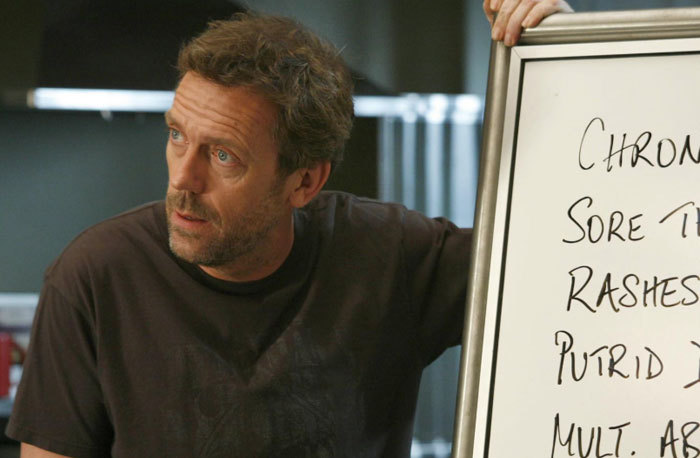
Image credits: ThunderClap_Fween
Gripping, fascinating, entertaining, and wildly unethical, House, M.D. wasn't your average medical drama... and it was never meant to be.
The online media database IMDb describes the main character Dr. Gregory House as "an antisocial maverick doctor specializing in diagnostic medicine [who] does whatever it takes to solve puzzling cases that come his way."
While House was marketed as one of the most accurate medical tv series out there, many experts would beg to differ. But even some of the real doctors who call BS on House's diagnoses admit they thoroughly enjoyed watching the show.
#2
None of them had a chance of affording him in the US healthcare system.

Image credits: clumsy__jedi
#3
Not a doctor, but it’s my all-time favorite show. Watching it with my daughter - she was inspired to study science and found she loves it. She is considering becoming a doctor as a result.
I don’t care if the show is accurate or not - it inspired a love of science in my kid, and I’m forever grateful.

Image credits: Misaiato
Take an expert who goes by Scott, for example. He spent hours reviewing and dissecting every episode of House on his blog, Polite Dissent. The blogger is a family practitioner, and has been lauded by experts as "one of the most dependable and dedicated analysts of medical TV shows."
While Scott has ripped apart the medical accuracy of House, he also doesn't hold back from praising it. "While it's certainly true that the quality of the show has suffered some over the past few seasons, it still remains the best medical show, if not the best show outright, on television," Scott once wrote.
#4
I always laugh when I watch House and the MDs are administering the meds and taking blood/tissue samples, rather than nursing staff. There's almost no nursing staff portrayed on the show. ABSURD.
#5
I love Hugh Laurie and watched some of the show, it was wildly inaccurate with respect to medicine but a pretty entertaining show.
But hilariously inaccurate. Pro tip: you don't need 3 specialist doctors to run an MRI, it's a huge waste of time and very unlikely any of them have any idea how to get a scan started in the first place, let alone how to read the images.

Image credits: Sea_Pomegranate_4499
#6
No comment on his diagnostic skills. However, I have shown the scene of him asking a woman who kept running out of her MDI to demonstrate to him how she was using it as an example to my students of why patient teach back is so important. Don’t assume they understand their medications just bc they don’t have any questions!

Image credits: RNBSN91
As one John Hopkins Medicine School newsletter pointed out, Scott's love for the show probably has to do with the fact that he wasn't watching it to learn, or to fact-check.
He was glued to the screen purely for entertainment purposes. And as many of us will agree, House was, and still is, wildly entertaining, even though it has been years since the show was discontinued.
"But there's also something about House's rude, blunt personality that appeals to viewers, especially doctors who would never be able to blow off clinic duty in real life," reads the newsletter. "The hero-as-a-villain is rarely done well, and while we probably wouldn't want to have House's heart, we wouldn't mind getting access to his brain."
#7
As an er doctor. When the altered patient or trauma patient hasn’t gotten their head ct until a week in the admission. Son, that ct is the first thing I’m ordering out of the ED.
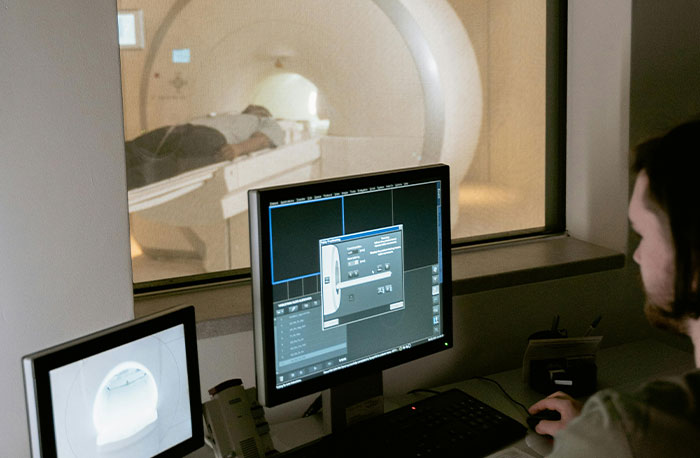
Image credits: MBG612
#8
House was like Scooby-Doo for adults. Mystery solved gang!
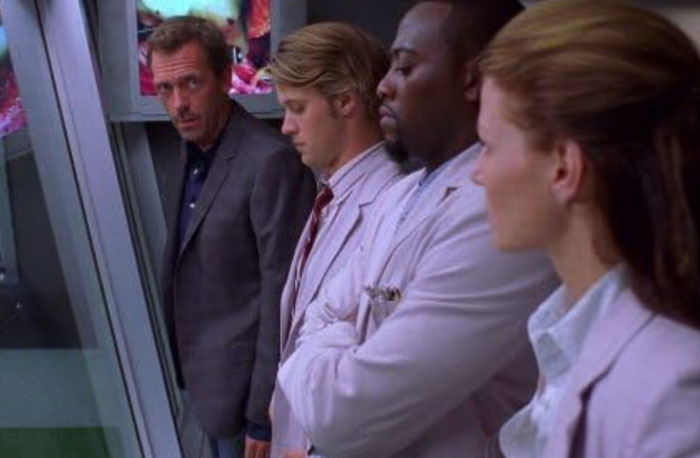
Image credits: tinlizzy2
#9
Not a physician, but there's an episode where he's treating a lady in just the brief clinic thing not the main case of the episode. She hit her head in a car wreck like a week prior and damaged her pituitary gland causing diabetes insipidus from a lack of anti diuretic hormone. He figured it out because she'd been drinking a lot of water. I saw that episode just before my interview for my first paramedic job. During the interview I was given an oral scenario for a fairly similar patient. Now DI wasn't really covered during paramedic school back then(it's still not given much attention). I don't think it was ever covered in class and was like two sentences in the entire textbook basically just saying it existed. I took the risk and sent it explaining that I thought the patient had damaged their pituitary in a fall family mentioned they'd had prior to symptoms starting and had developed diabetes insipidus causing their electrolytes to be out of balance because they wasn't reabsorbing water normally. They were so impressed I got immediately offered the job and was able to negotiate higher starting pay. I've made more money and gotten better opportunities at every agency I've ever worked based on that one stupid interview where I rolled the dice on a random writer on House having done their homework. Looking back at the show now with a lot more medical education and experience the main cases tended to be really exaggerated and incorrect, but the little random throw aways were often fairly accurate.

Image credits: tacmed85
Another doctor, Kyle Bradford Jones, MD has also admitted to binge-watching House. He once wrote an entire post on the physicianspractice.com site about what he's learned from the show, saying being a viewer has actually made him a better physician.
Jones adds that he can't pinpoint why he loves House so much but there could be several reasons. "Maybe it's because I like to appear smart by pointing out the ways in which the writers got a medical term or concept wrong. Maybe it's because I want to imagine my practice as dramatic as those on TV, saving lives in a thrilling and effective manner. Or maybe I just find it entertaining," he wrote.
#10
I will say the episode where they used ketamine to treat House’s leg pain was ahead of its time and I have to credit it with being able to discuss alternative treatments for chronic pain. Not a doctor, just someone with chronic pain that no one was willing to treat without narcotics for a long long time.
#11
I gotta say, prescribing 1 cigarette to help a patients constipation has always stuck with me.
Smokers know how quick that first one of the day can get your guts going.

Image credits: bailz2506
#12
None of them. Honestly the show was just so insanely inaccurate it's impossible to remember and track. There's no central all diagnosis super team. There's no super surgeon Robert Chase that is on said diagnosis team and then also somehow a plastic surgeon, neuro surgeon, orthopedist, general surgeon and cardio thoracic surgeon. The dude would have been in residency until he was 65.
The Pitt was crazy accurate, albeit the nature of that shift wasn't accurate.
Scrubs was oddly and beautifully close to accurate.

Image credits: SkippyBojangle
One of the things the show has taught Jones is to always advocate for his patients. "For all of Dr. House's faults and eccentricities, he will fight tooth and nail for his patients. He will buck all administrators, colleagues, and standard practices to ensure that his patient gets the utmost care to save or improve their lives," writes the expert.
"Patients obviously come to us at their sickest and most vulnerable, at a time when they most need an advocate against any barriers they may be facing," he adds. "Patients may not have a way to recognize the extent of your medical knowledge, but they will never turn on someone who fights fiercely for them."
#13
House diagnosed a patient with Chronic Fatigue Syndrome, and let's assume it was correct for a second. His treatment was tic-tacs in a pill container because "it's all in the patient's head" and a placebo would "fix them". CFS (now called Myalgic Encephalomyelitis) is a neuro-immune mess that can be seen in a laboratory setting, and is not psychological. It needs to be managed with rest and pacing, not weird placebos. Patients who are given placebos often over-exert, which can make the already-debilitating disease permanently worse. ME/CFS has the lowest average quality of life of any disease studied, including various cancers, depression, and more, and it's because the most debilitating forms of it are completely awful. [https://journals.plos.org/plosone/article?id=10.1371/journal.pone.0132421](https://journals.plos.org/plosone/article?id=10.1371/journal.pone.0132421) So House probably gaslit this patient into making themselves permanently worse, leading to much worse quality of life and/or death.
#14
Foreman getting Naegleria fowleri and surviving it without any brain damage kind of ruined the show for me. It is almost always fatal, and there is no known treatment regimen with proven efficacy. The handful of known survivors reported in medical literature typically have a prompt diagnosis and initiation of amphotericin B (Foreman was definitely delayed). Because those patients survived with it, amphotericin B (with or without other d***s) is pretty much universally given in Nargleria cases, and the vast majority still die anyway.
Don’t swim in freshwater lakes and ponds, and definitely plug your nose if you do.
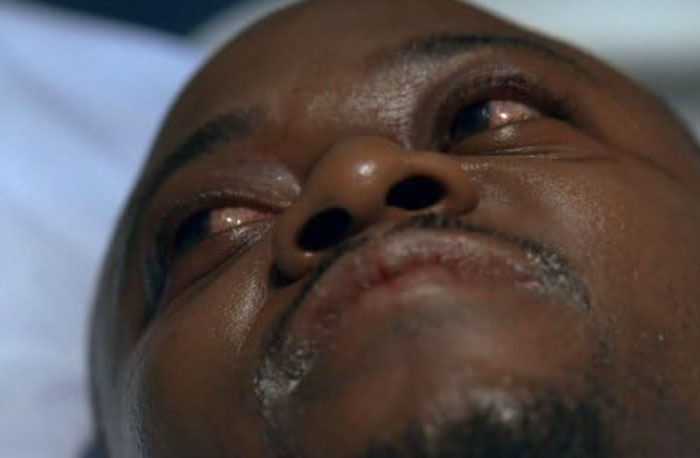
Image credits: nimaku
#15
Not a doctor (shh!) but there was a doctor who maintained a blog throughout the original run of the show commenting on the accuracy of the presentation and diagnostics of each case. The original site is gone now, but the Internet Archive has it saved. It was fun to re-read it while doing a rewatch last year.

Image credits: VoraciousChallenge
Jones concludes that while House, M.D. is a "dramatic television show with multiple inaccuracies and stretches of reality," it's a useful tool for real doctors, and a reminder of how they can improve in their own professions.
And as the Collider site rightfully points out, "If we wanted every bit of a medical drama to be realistic, we’d be better off going and sitting in a hospital. We wouldn’t want to do that, though, because the point of TV is to be entertained."
#16
I'm not a doctor, but I'm pretty sure there are more nurses at a real hospital. There's like five people working there and they're all House's team.
#17
I’m an ENT and the kid with the cochlear implant stood out to me. 1 A general surgeon can’t do a cochlear implant. Not all ENTs even do them. 2 He did it at the same time as a “dirty” abdominal case. You don’t do “clean” and “dirty” cases together. That’s how you get ecoli meningitis 3 Cochlear implants require you to order an expensive device (they don’t just keep a device that’s more expensive than your car on the shelf) and have a specialty trained audiologist in the OR with you to program it.
#18
When you go to medical school, one of the phrases you hear over and over again is "when you hear hoof beats, think horses, not zebras." In other words, investigate the common things first, because you will rarely encounter rare conditions. Not only is House SOLELY zebras, it's the rarest zebras of all, things that you might see once in a career (but more likely might only read about), on a weekly basis.
#19
Foreman. When he contacted a *Naegleria fowleri* meningoencephalitis in the episodes Euphoria. [S2E20-21] (the episode with the weed farm watering system and blind pigeon).
I saw it during the year in medical college when we had the subject of Microbiology. We had to study the amoeba, and even looked it up for this episode. We even had a discussion about the topic in question amongst us friends, because mortality at that time (2014) was 99% with only 1 or 2 reported survival cases. Current mortality rate still is 97-98%. So at the time it aired, in 2006, survival stats had to be even lesser.

Image credits: vodortorof
#20
I remember an episode where they ruled out something by doing a muscle biopsy. It was such a throwaway thing like it was as simple as a blood test and they got instant answers.
I’ve had a muscle biopsy. It’s a full proper surgery, I couldn’t walk for 2 weeks, and it took 4 weeks for results to come back because it’s apparently quite complicated pathology.

Image credits: Ididntvoteforyou123
#21
I have myasthenia gravis. The f*****g tensilon test on the bicycle road racer was hilarious.
I went from drooping eyelids and severely slurred speech to having control over my face and hands and then back again in like 5 minutes.
I didn't fall down, but I was right back to slurring.
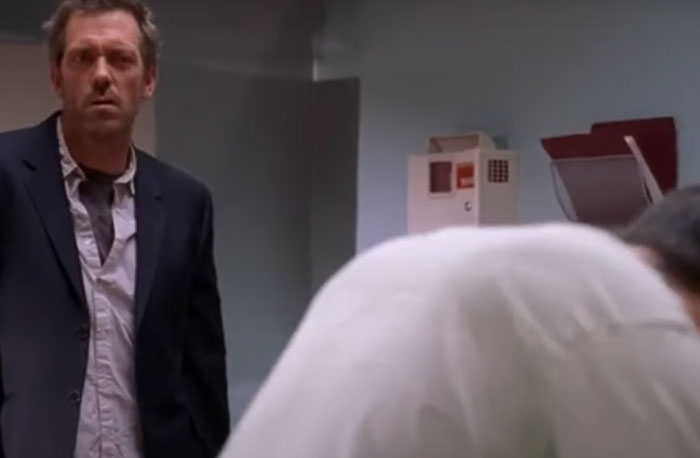
Image credits: Dexter_McThorpan
#22
There was one ep that featured a disease I happen to be very familiar with, POTS. And to their credit, the patient of the week did have a very classic presentation of it. But where it fell off for me was a whole team of fancy diagnosticians taking a week to reach the diagnosis, when it was SUCH a classic presentation that anyone who'd so much as done an internship round in cardio would have known it instantly. It wasn't bad writing exactly - not by the lax standards of that show, anyway - but it definitely c*****d me up because it SHOULD have been one of the ten-second bits of House looking at a chart, yelling a diagnosis, and wandering off again.

Image credits: sorrelchestnut
#23
Dr. House should have been dead from Tylenol o******e/liver failure like 3 episodes in.
#24
Not exactly what you're asking for, but I have an example of something most real world doctors could have caught.
There was an episode where the patient turned out to have Hemochromatosis. This essentially means that the body has a large build-up of iron in the bloodstream. I'd be amazed if an actual doctor missed that on the bloodwork
TIL: There are cases of this happening. Score 1 for House, I guess.

Image credits: Clear_PR_Stunt
#25
Foreman was negligent for not seeing rabies in that woman. A f*****g bat flew from her homeless shanty tent.
#26
As a doctor, House was probably my favorite medical drama. All the others except Scrubs are kind of all the same. That being said the medicine in it was all over the place, I wouldn’t say any of the diagnoses were particularly brilliant bc the almost of none of the conditions were diagnosed the way they would be in real life.
#27
Years ago, I brought the show up to my Rheumatologist when my relatively rare disease was the diagnosis. He went on a long angry rant about how any competent doctor can diagnosis that show within the first 5 minutes.
I didn't care. I'm not a doctor.

Image credits: CatalinaBigPaws
#28
You have to understand, the show wasn’t written by doctors. It was written by TV writers with no background knowledge of medicine.
None of it is brilliant medicine, it’s just entertainment. .

Image credits: _goblinette_
#29
There are several rare genetic diseases (like factor V Leiden, which my mom has) that would have been immediately obvious in infancy or childhood so it is just an idiotic thing to include in a differential of an adult. Yeah, they might have overlapping symptoms but obviously the cause is different.

Image credits: anothercairn
#30
Brilliant: House diagnosing rare autoimmune or metabolic disorders with just a hunch—stuff like the guy with the exploding leg veins or the girl whose body literally produced its own poison. Those are surprisingly plausible in the real world; some clever doctors actually do solve crazy cases like that.
No hope IRL: pretty much every patient who follows House’s ‘break all the rules’ treatments. Giving someone a risky d**g with 0 testing, doing experimental surgeries without consent, or letting them near a tapeworm trial? Most of those people would have died or sued in real life. Basically, House’s genius works on TV, not in any hospital worth its malpractice insurance.
#31
Bringing a live pig into the hospital to exchange blood with a patient? Totally normal, I do it all the time.
#32
It’s never lupus.
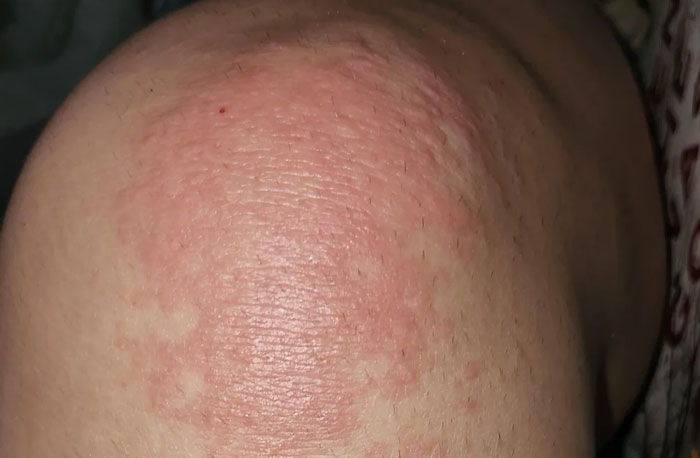
Image credits: One-Eyed-Willies
#33
House's own injury would have killed him before they actually diagnosed it.
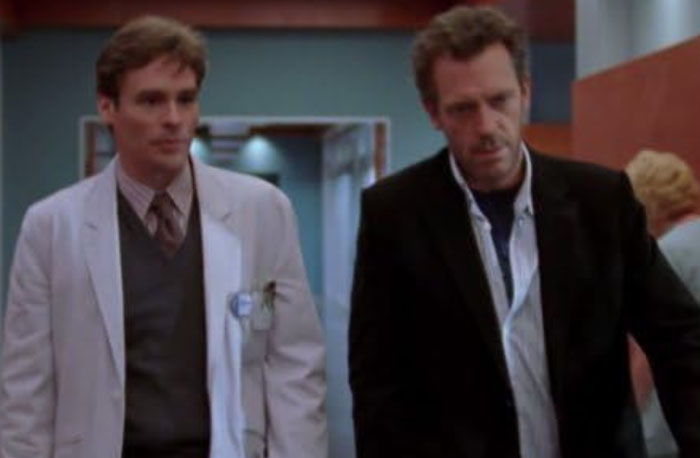
Image credits: crazypurple621
#34
There's one episode where House sees a red thong and decides they must do a Congo red stain to test for amyloid.
He comes in " quick, put the Congo red on, polarise the light..."
Dude, it takes me an hour to do a Congo red stain and there ain't any magic microscope computer that can tell you it's type AA.
There is one episode where Chase is tasked with doing gram stains all night, next morning House asks him if he had anything, and he says "purple fingers" which amuses me greatly.
#35
Not a doctor but i work in the lab. One of the first episodes had a patient that they were worried was deficient in potassium. They broke into this persons house to see if they were right. A test for potassium can be done easily within 15 minutes of that blood work being drawn.
There was also one episode where they were checking for lupus? More specifically they did an ANA test and irl this test is done using a fluorescent microscope and looking at where fluorescent bound antibodies are binding on special cells. In the show one of the characters kinda shook a clear test tube and was like “well their ANA is negative!”.

Image credits: Annual-Arugula473
#36
Everyone actually had Lupus. He was just making all the other s**t up.
#37
There used to be a Twitter thread about how all the House episodes would have been solved with basic medicines and all House did was prolong the process.
I don’t remember the link, maybe someone else has it.
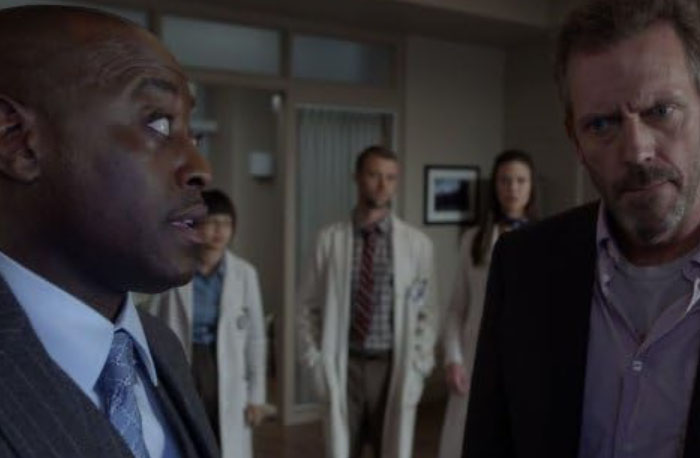
Image credits: AOWLock1
#38
I loved House as a show. But deep down I think it was created by Big Health Insurance to normalize doing insane tests at ridiculous cost to maximize profits. I also think CSI was created to normalize an increased surveillance state, so take it with a grain of salt!
#39
I am binge watching House M.D., everyone's favourite diagnostician for the first time, and some of the fantastical scenarios while implausible are still interesting.
The show has some wild cases... and of course, the classic House diagnostic loop: throw out three exotic conditions, treat the wrong one, nearly k**l the patient, then circle back to the first idea they had. So I’m curious:
- Which diagnoses or treatments were actually brilliant medicine?
- Which ones would never have worked outside of TV land?
- And if the patients were real, how many would’ve actually survived? For days, months, or years?
I'm only part way through the show but enjoying every moment :).
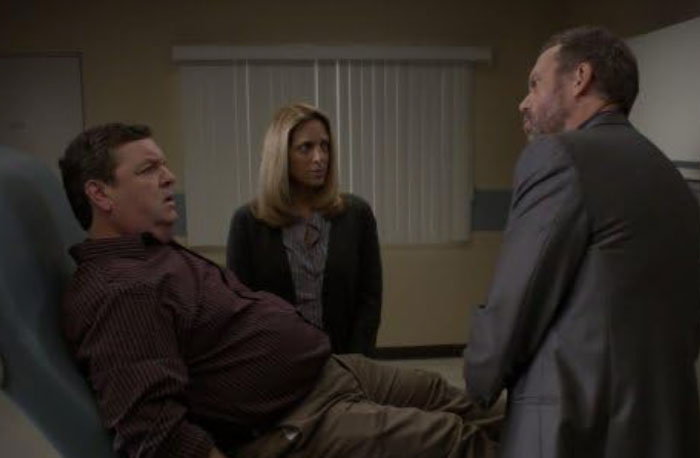
Image credits: theskullcave
#40
Don't get me wrong, I adore House. But I think those writers only knew like five diseases. I think they had to bring in a guest writer for every episode just to have something to write about. Everything was either lupus or whipples. The one episode where somebody would definitely have died is (trying not to give spoilers) the kid whose cat died and dad breaks doc's nose, or the girl with a tick in her nethers. My favorite episode, though, is the chess kid with an attitude problem and a fondness for shrooms.







